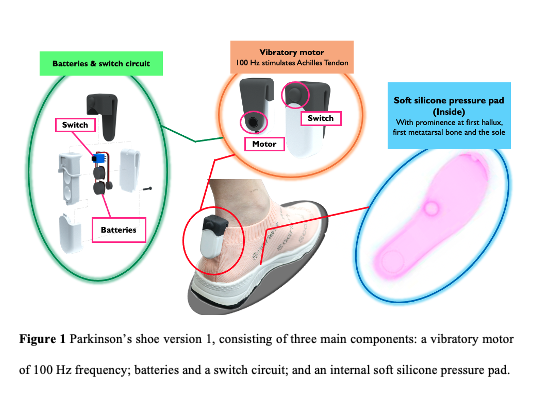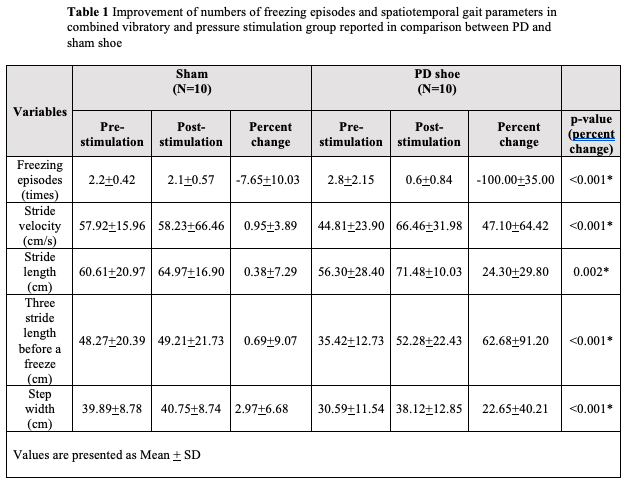Objective: To explore the effect of the novel PD shoe on FOG and gait parameters in PD patients with unresponsive FOG.
Background: Freezing of gait (FOG) is often unresponsive to pharmacologic treatments due to multiple underlying mechanisms. Abnormalities in peripheral sensory systems including impaired proprioception, decrease cutaneous mechanoreceptors and plantar pressure sensitivity could be one of the pathophysiologies that contribute to FOG in Parkinson’s disease (PD). Combined vibratory and pressure stimulations at the plantar areas was demonstrated to improve FOG compared to vibratory or pressure stimulation alone in our previous study. The novel PD shoes that embed the vibrations and pressure stimulations has been developed as the potential treatment of FOG.
Method: PD patients with unresponsive FOG were recruited and randomized into PD shoes and sham shoes . A prototype of novel PD shoe consisted of vibratory stimulation applied at the Achilles tendons at the frequency of 100 Hz with a switched battery circuit and internal soft silicone pads pressured at plantar areas (figure 1). A sham shoe consisted of vibratory motor without stimulation, and internal soft silicone pads. The shoes were worn for 5 minutes prior to the objective gait assessments. Outcomes included the normalized percentage of changes in numbers of freezing episodes andspatiotemporal gait parameters between pre and post-stimulations.
Results: Twenty PD with unresponsive FOG patients (10 patients per arm) were enrolled in the study. The PD shoe group showed significantly decreased numbers of freezing episodes (p < 0.001), increased stride length (p = 0.002), stride velocity (p <0.001), step width (p < 0.001), and stride length in the three strides before freezing episodes (p < 0.001) when compared to the sham group (table 1).
Conclusion: Our pilot study demonstrated the benefit of the novel PD shoes consisting of combined plantar vibratory and pressure stimulations on unresponsive FOG. We propose that the novel PD shoe could be a potential treatment of unresponsive FOG in PD patients.
To cite this abstract in AMA style:
W. Phuenpathom, P. Panyakaew, R. Bhidayasiri. A Novel Parkinson Shoe: A potential treatment of Unresponsive Freezing of Gait in Parkinson’s Disease Patients [abstract]. Mov Disord. 2022; 37 (suppl 2). https://www.mdsabstracts.org/abstract/a-novel-parkinson-shoe-a-potential-treatment-of-unresponsive-freezing-of-gait-in-parkinsons-disease-patients/. Accessed February 20, 2026.« Back to 2022 International Congress
MDS Abstracts - https://www.mdsabstracts.org/abstract/a-novel-parkinson-shoe-a-potential-treatment-of-unresponsive-freezing-of-gait-in-parkinsons-disease-patients/


